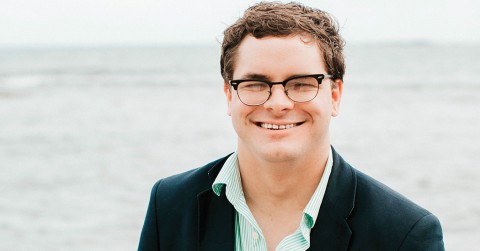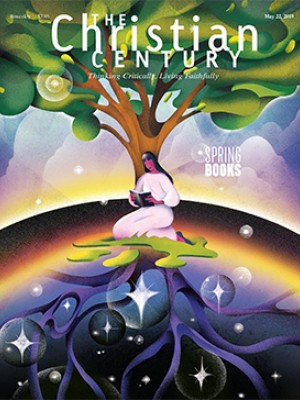A white, southern pastor takes a hard look at the sin of racism
“It’s not that Southerners don’t get racial issues. We just don’t get them right.”

Robert W. Lee, 26, is a minister ordained by the Cooperative Baptist Fellowship and the author of the just published book A Sin by Any Other Name: Reckoning with Racism and the Heritage of the South. Lee, who has been a pastor in North Carolina, the great-great-great-great-nephew of Confederate general Robert E. Lee.
How and when did you first become aware that you’re related to Robert E. Lee?
Because I bear the name Robert Lee, people made that connection pretty quickly. As a kid, I was rather proud of it. I didn’t understand the full weight of it. I was just proud to have a famous distant uncle. I had a connection to history that other people didn’t have.
Read our latest issue or browse back issues.
As a teenager, you had a Confederate flag hanging on your bedroom wall. What made you decide to take it down?
I came to understand what the history meant, especially as I started to discern a call to ministry. I had a mentor in confirmation who called me out on this. She said, “If you are called to ministry, this flag is incompatible with that calling.” It took a strong woman of color to tell me to take the flag down. I was taken aback by her courage, by the strength that it took. Hers was the prophetic voice I needed to hear.
I try to be careful when I tell that story, because I do not want it to be incumbent on people of color to tell white people to get their stuff together. But it was a powerful moment in my life, when someone took the time to tell me: this is not who you are, this is not who your parents raised you to be, and this is not who God called you to be.
Tell me about the churches you grew up in.
The Methodist church I grew up in was a white church. I write in the book about my dad as a teenager playing pool in the basement of the church with the sexton, who was black. That was my dad’s first challenge to the segregation in the church. I did not fully understand why we had—we still have—two First Baptist Churches in Statesville, North Carolina, which is where I grew up and now live. There is a white First Baptist Church and a black First Baptist Church.
What conversations on race are needed?
Southerners are often regarded as hicks who just don’t get racial issues. I think that is terribly unfair. I think we get them very deeply. Do we get them right? No. But it is not out of naïveté.
We have an unwillingness to confront the racism that is written into our history because of the social consequences of doing so.
We have to develop a language to bring people into the conversation. That doesn’t mean condoning everyone’s views. But we have to take seriously the possibility that people really do want to understand each other.
You’ve used the metaphor of resurrection to sketch out a vision of the South “rising again” as a radically inclusive society. What needs to be done to get there?
We have to recognize that there were pastors during the Civil War who preached for the enslavement of black people. If you go through the history of our nation, you see racism everywhere. We have to say: this history has been awful—but we believe in a God of resurrection who can bring from the dead even those things which are too damaged for us to repair.
One of the most powerful stories of resurrection in my life is being invited to preach at Ebenezer Baptist Church in Atlanta, where Martin Luther King Jr. was once pastor. I will never forget walking up to the pulpit and looking out over the congregation, which included members of the King family. There was a moment of such intensity for me: a descendent of Robert E. Lee standing in the place where Dr. King preached some of his most important sermons. If that isn’t part of the coming of the kingdom of God, I don’t know what is. I am sure I just fumbled my way through the sermon, but that is what the reign of God looks like: someone with an awful past being given a new future.
If a mostly white congregation asked for your help in moving forward on racial reconciliation, what advice would you give?
The process has to be organic. It can’t come from the pastor, who in the Methodist church, for example, might be gone in three years. It has to be a lay-led endeavor. And there has to be a recognition that there are some pitfalls that come with being an all-white church, some blind spots, and some misunderstandings.
We can’t tokenize people. We can’t just call up the church down the street and say, “Hey, we are coming over to worship with you.” Likewise, we can’t just invite them into our space. We’ve got to cultivate some neutral spaces and some shared spaces. In Statesville, the Civic Center might be a good place, because it is not a white-dominated space with a white Jesus staring down.
White Christians have to approach reconciliation with an air of humility, with active listening, which can then become real conversation. White people have to take themselves out of the driver’s seat. We should study theologians like James Cone and King and learn the history.
Not that whites don’t have things to offer. White Christians might ask themselves what resources they can offer—money, time, talents, connections, infrastructure, or other things.
In your book you use the phrase the “reteaching of loveliness.” What do you mean by that?
The poet Galway Kinnell said, “Sometimes it is necessary to reteach a thing its loveliness.” My mentor Nathan Kirkpatrick used that line in my ordination sermon.
He also said that in being ordained I was accountable to the world in a new way. But each of us is accountable. There are things going on that we cannot allow to happen, like the white supremacists’ march in Charlottesville. We have to help people remember their own loveliness and the loveliness of others—remember that we are all created in the image of God.
A version of this article appears in the print edition under the title “Reckoning with a racist legacy.”







